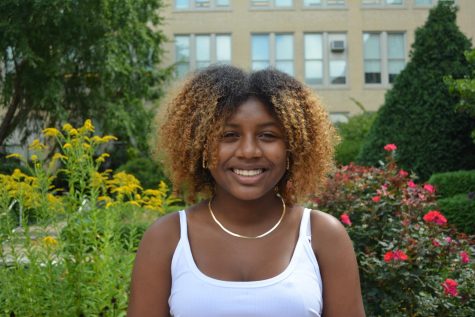‘Ginny and Georgia’ season two tackles common teenage issues as plot develops
March 6, 2023
This review contains spoilers from season one and two of “Ginny and Georgia”
Netflix’s new breakout dramedy is comparable to the comedic dynamic between the mother-daughter duo seen in the popular series “Gilmore Girls.” “Ginny and Georgia,” first released in 2021, is a Netflix chronicle of the story of a mother Georgia Miller (Brianne Howley), and her daughter Ginny (Antonia Gentry) as they go through life in the fictional town of Wellsbury, Massachusetts. Ginny is an angsty teenager who often feels more mature than her mother Georgia, who had her when she was just a teenager. This is similar to Lorelai Gilmore’s position because both of the women raised children while still being children themselves.
The series begins with the mother-daughter duo having lived in countless states, moving whenever trouble strikes. Together, in their new town of Wellsbury, they begin to create a life of their own, and Ginny becomes best friends with their neighbor Maxine (Sara Waisglass). However, a dilemma erupts in their friendship when Ginny goes on to develop a love interest for Marcus (Felix Mallard), Maxine’s twin brother.
Georgia on the other hand unexpectedly combines her personal life with her work life when she begins her new job at the mayor’s office, even striking a relationship with Mayor Paul Randolph (Scott Porter). Throughout the series we learn about Georgia’s past and the way it affects their current relationship.
Their life in Wellsbury is turned upside down when a private investigator comes to investigate the strange death of Georgia’s last husband. This causes Ginny to question her mother, and as a result distances herself. However, this last season ended before she was able to confront her and left their mother-daughter relationship at stake.
The long-awaited season two was finally released Jan. 9, 2023, and in comparison to the first season where issues were briefly touched on, this season dove right into some heavier topics including self-harm, body dysmorphia, abuse and racism.
This season starts with Ginny and her little brother Austin (Diesel La Torraca) taking a two-week trip to her father’s house. While there, Ginny confides in her father, finally telling him about her self-harm and from there she starts therapy. After a two-week break, Ginny and her mother reunite and the tension is high after they have a heart-to-heart in Georgia´s car. Later, Georgia finds out about Ginny’s self-harm, which leads to an emotional confrontation about what life events led Ginny to self-harm. After this confrontation, Georgia accompanies Ginny to therapy where they both come to certain realizations about themselves and each other.
Another big topic dealt with this season is body dysmorphia through the character of Abby, who is Ginny’s friend. Abby struggles with bulimia nervosa, a disorder where one eats and then purges their food. This bulimia is rooted in her family struggles and evolved in season two. In this season we see her struggle immensely with the size of her thighs, resorting to extreme measures of taping them to make them appear thinner. Abby has been struggling with body dysmorphia since season one; however it became exacerbated after her alienation from her friends in season two.
Teenagers undergoing body image issues are not depicted in the best manner because it makes the character seem desperate for attention, when in reality she is hurting, and the result of her dealing with this alone could impact her life. This show is TV-14, and therefore needs to put more emphasis on where her eating disorder is stemming from, because it would make her character feel more authentic. Her character is not being explored enough, leaving the feeling like her struggles are less crucial to the storyline.
Marcus was undergoing an episode of his long battle with depression. His parents noticed him calling for help and had Marcus meet with a psychiatrist and go back on antidepressants. Throughout the last few episodes, Marcus’ character became slowly invisible because Ginny too heavily focused on herself to acknowledge his mental illness. We see the progression of his struggle with depression and how it affects him and other people. His struggle with depression makes him feel as though Ginny is his only source of happiness and feels that that isn’t fair for her to have to carry. This is a very real struggle that many people deal with not wanting others to carry the burden of what you are going through.
Ginny attending a predominantly white school was yet another battle she had to persevere through. She had to fit the white people’s narratives constantly and therefore struggled with her own identity as a Black woman. The racial discrimination Ginny faces from her English teacher, Mr. Gitten, is one so heavily targeted and alienated. It felt impossible for Ginny to feel understood when her white mother and teachers were equally as ignorant of her struggles.
The series also dives deeper into the past life of a much younger Georgia Miller. This season we learn about the abuse she faced in the past by Austin’s father, and the great lengths taken to get him incarcerated, in an effort to protect her children. However, he returns from prison and causes quite a stir, which ends in a traumatizing confrontation when he quickly returns to his old ways.
At the very end of this season, we learn that the detective finally gathered enough dirt on Georgia to have her arrested at her wedding. The cliffhanger has us in suspense as to whether she will be released or tried for murder.
For season three, we would like to see Georgia’s family not only stand by her side throughout the investigation, but also testify in court. Although Ginny and Marcus both struggle individually I would much rather see them as friends because they both are struggling right now and need space to heal not depending on each other for happiness. In order for this relationship to be healthy and for them to not be emotionally dependent, they have to better communicate their needs, even if that means being apart. I hope to see the discussion open surrounding Austin’s possible learning disabilities, rather than shying away from it because he’s too “young.”
This next season will have us on our toes as we watch Georgia Miller’s trial and potential testimonies take place. Is Georgia Miller really innocent until proven guilty? Find out in season three, coming to you on Netflix.












